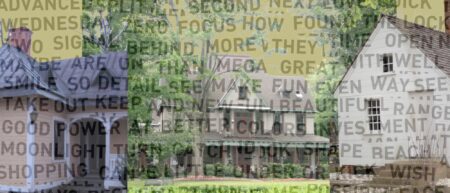It happens slowly, but if you’re lucky people will forget your dead name after a year or so. Or maybe forget isn’t the right word. I know they still remember, may even feel it pressing against their teeth before they bite it back. It’s nice, however, to pretend that your chosen name, the right name, was the name you were born with—that there’s nothing people could point to for evidence of your assigned, “real” gender or the life you were forced to take on before you decided to live as who you are now.
And when I say family, I don’t mean blood family, although some are lucky enough to have that. Many don’t.
As I write this, I’m back in Japan for research supporting my graduate thesis project. The first part of this trip took place in Hiroshima, where I spent most of my childhood summers, trying to learn about the modern day efforts of anti-nuclearism and the lasting effects of the atomic bomb. My great-grandparents were hibakusha—A-bomb victims—the scars of which have been passed down to me by my grandmother, who raised me. She was also in Hiroshima at the time of the bombing. While I’ve had some successful interviews with hibakusha, as well as nonprofit workers and people from my town, many others fell through. Most days I don’t write at all. But I am trying to understand family, belonging, what justice and peace and evil look like to my people, and what war does to the psyche. I think that through these strangers I have met, the people I have become close to in my month here, I am also trying to be closer to my grandmother, though I know this isn’t possible.
It’s easy to re-traumatize others in ways both large and small when you haven’t worked on undoing the rot that comes from the past. You stop extending compassion because compassion hasn’t been extended to you. I don’t say this to imply that my grandmother has ever done anything but love me; it’s that her love is a suffocating, wayward thing that doesn’t know where to go but inward. Rather than accepting that I may not be fully a girl nor fully a boy but something very in between, she’d rather accept the child that she raised in her head, the one she can keep small and safe and girl-like.
So I try to keep this love, however difficult, in mind when my grandmother and I eat dinner at the house of a family friend, Asao-san. Here in the countryside of Hiroshima, there is so much wilderness that it demands your attention, asks you why you’re on your phone instead of being in community with one another. But I am on my phone nonetheless, bored with my grandmother and Asao’s conversation, my mind drifting despite my attempts to stay present.
It’s June. Pride month. I scroll through pictures on my phone of people posing in rainbow underwear, throwing boas at the crowds from floats, eating ice cream the size of mountains. It is us, beginning again. Others remind us that we shouldn’t forget what Pride is truly about—not an opportunity for corporations to profit off of queer people, but to point to injustice. To alert us that this is a time for celebration and community but also for great resilience. To make us love each other ever deeper. When I think about who has cleansed me of my rotten plum sadness, kissed my sores, taught me to glory in my small things—toenails, lisp, belly, lump of words plugged in my throat—it is queer people of color. They are the ones who have taught me that love not only looks like warming cold plates as you wait for their return, but also warning against destroying others in the midst of your own self-loathing. They are the ones who have taught me that true restorative justice looks like checking your wrongs, wanting for you to come back to yourself.
I look up from my phone. There’s so much to take in—the trinkets on the table, pictures, the newspapers and magazines littering the tabletops. It’s a house I’ve known for years. Once in the room next to this one, I cried and almost wiped my snot all across the green floral pattern of a furisode sleeve after my grandmother announced that we would not be returning next year. In this kitchen I’ve sliced carrots, skinned potatoes, fried sardines in oil. Outside, the frogs gulp down huge pockets of air and belch them back out.
“!” My grandma calls my name, or what was once my name. I turn around.
“I brought you a razor. Here.” She walks into the living room where I sit under the kotatsu, pulls out a razor from her bag, pushes it across the table. It’s a complimentary one from the hotel—a clean plastic white, too dull to be a weapon.
“No thank you, I’m good.” I push it back across to her with force.
The other day in the bus, she had seen my hairy legs sprouting beneath my shorts for the first time, although I don’t know how she hadn’t caught on until now. What’s going on with you? You’re like a different person. You’re going to get made fun of when you get back to school, you know. Instead of telling her that those kinds of people who would make fun of body hair were the exact people I couldn’t care less about, I simply looked out the window and regarded the stones, furry and soft with moss, lining the edges of the street like mushrooms.
The TV keeps playing in the living room. The kotatsu is very warm. Her face fills with rage. My grandmother is a woman who does not like to hear no, who never knows how to say sorry.
“.” The dead name again. “What are you doing? You’ve changed so much. It’s like you’re not even my granddaughter anymore.”
The room is quiet for a moment. Asao-san pretends to be preoccupied with scrubbing a dish in the sink and doesn’t look up.
She continues on remorsefully. “Are you becoming a boy? Is that what you want? If so, I’m not going to talk to you anymore. I’m not going to have anything to do with you.”
The frogs weep. Asao-san scrubs the pot harder. I feel a mixture of anger, sadness, and shame—at myself for not being able to be the girl she wants to me, at her for being so ruthless, so unwilling to love anything that she can’t understand.
“That’s fine,” I say in English. She can’t force me to humiliate myself in front of someone else, not this time. “I don’t care. I don’t want anything to do with you anyway.”
We are all silent for a second.
“.” The way she says it makes it sound just like that—a period, no joy. Nothing. Just absolute, as if it was something I can’t change.
I slide the door open and walk out. I shut it behind me, quietly.
⚧
Recently, a piece for The Atlantic garnered a lot of attention because of its narrow view of trans people and the right to their bodies. Upon first read, it seems like fair reporting—these young people talk about the purported stress they felt to transition, the happiness they felt upon de-transitioning—and yet the danger of the piece is in its omissions. Where does it talk about people assigned male at birth? Does it talk about why many trans femmes choose to de-transition not because they’re not actually trans, but because they are tired of being mocked and threatened with ongoing violence? What purpose does such a piece serve if not to be another source that transphobic people turn to as perceived proof that being trans or genderqueer is something that you can one day outgrow?
In The Atlantic essay, change is weaponized rather than savored and prized. There is a beauty in coming into yourself, in knowing yourself truly. But for the many, many trans and gender variant folks not presented in the essay, it’s about rejecting what they have been taught about gender, knowing that there is more to gender than they have been taught.
Suppose if everything stopped being so definite, so rule-ridden: We would shed our names like water when we outgrew them and pick new ones from trees. Legal forms would be sprayed through the air like confetti. In my dreams I see a throng of queer folks of color holding hands, some slipping, sweating across the sun. No one would be coming out because everyone would just be. It sounds too good to be true, a hope impossibly childish and unripe. And yet I personally like to believe that such a world is possible: that in the midst of this hopeless time, we are all floating toward something greater.
⚧
Nothing happens after I slide the door closed, of course. We continue on as normal, which means the threats are there and they are loud but this is something I am used to. The door opens an hour after it has closed and she is good at pretending that nothing has happened. I am good at believing her.
The shinkansen ride to Kamakura from Hiroshima is long. Asao tries not to cry while we hug but she does a little anyway and I pretend not to see. In Kamakura I will stay with my friend Nami, ride the train to places like Yokohama and Shinjuku to see other queer friends, wander into anyone.
I find a nonprofit online named SHIP Yokohama. It advertises a safe space for queer folks to gather, to receive counseling, to provide information and care for anyone who walks through their doors. When I walk into the office, I feel quiet in a good way. Or maybe that is the magic of remembering—maybe my brain was just as loud as always, maybe it wasn’t, but in my head it was a beautiful moment that I could hold.
I talk to the man behind the counter for a while. He is kind, eager to talk to me about his trips to San Francisco and the activities they have here at the center, which range from counseling to HIV/AIDS testing to providing questioning folks with information on the LGBTQ community. I flip through books and land across one that I translate into My Second Coming Out Story. On the cover is a person wearing all black, holding a poster that says SILENCE IS DEATH. And I want to tell this person: yes, I am dying every day, and no one knows it and there is no way to talk about it.
I have this thing, I want to tell the kind man at the desk. They’re called personality disorders. Listen, it wants to kill me—kill my connections to others, kill myself. Are you scared of me?
But instead I start telling a story.
“Once,” I begin, “I was in a bus traveling from North Carolina to New York. And this woman, she’s looking at me, and I look at her. I forget what happened; she heard me say something about Japan. Her eyes just shoot up. Like suns. And I look at her and think, I’ve found a shard of myself that I didn’t know was missing. And so I go back to my seat, and there are these two other women who I’ve been talking to for almost ten hours. One of them has a grandson who she asks me to tutor in English. He’s smart, he just doesn’t know how to arrange letters, and yes, I know what she means. The other one is sixteen and is taking care of all of her eight brothers and sisters while she has a broken foot. I tell them that I saw her, this woman who looked at me like she loved me. And so I ask them, these new friends of mine, should I ask her to sit with me? In this seat? And they say yes.
So she comes and sits next to me. This woman has every Nora Roberts book that’s ever been published. She’s a Christian; once she enrolled in ministry school on accident and taught everyone how to sing a hymn in Japanese for their last recital by leaving voicemails on their phones every night. She talks to me about Japan. I call my grandmother and then they talk for a while—about the war, famine, religion.
And then she pulls out her phone. This is my wife, she says.
Your wife? I ask.
Yes, my wife, and she passes me the phone and I can’t stop looking at the picture.
I’ve never met a Japanese elder who’s queer before, I say.”
At both this point of the story as well as in its re-telling I begin to cry. And I wish I could stop crying because it’s embarrassing, I don’t want to, I never want to.
“I’m sorry,” I say to the man at the desk. “It’s just that my baachan says she doesn’t want to be my baachan any more if I’m like this.”
He is quiet for a while. He doesn’t reach toward me or anything like that, instead averting his eyes to the desk.
“I’m sorry,” I say again. “Sorry.”
“My parents didn’t know either. I never told them.” He is careful with his words. I appreciate this. “And my mother died. And my father, you know, he has Alzheimer’s, so it wouldn’t matter now. But now I wish, maybe I should’ve told them.”
“Oh,” I say. “Yes.”
We share this moment together, hold it like soft, melting glass.
⚧
I don’t have a lot of moments of calm any more. Or I should say, I’m beginning to think I never really did. What I thought was calm was just the times when I could bear to be in reality for a second before realizing it was better to not be there at all. For once I want to be still, for my brain to be still, but it wants everything from me: control over my emotions, actions, ability to ever be fully in reality. There is never enough quiet to cover me.
When I first found out I had borderline personality disorder, my therapist first told me that it was something called complex PTSD, something that bears a lot of similarities to BPD. She showed me a list of the symptoms and I remember, for the first time in twenty-four years, feeling free. To have a name for this, although the number of diagnoses has grown since then.
That week, I had a plan to kill myself, which almost everyone does at some point in their lives. I don’t pretend I’m special because of this.
My grandmother came to see me because of it, and even now, after we’ve returned from Japan and I’m back here in North Carolina, she won’t leave. Does my grandmother fear that I’ll die once I’m out of her presence if she doesn’t play a hand in making me feel useless and unwanted? But I know this isn’t true: she loves me in a way that demands control at all times. It isn’t hatred because she wants me to be well and healthy, but only on her own terms. If I were to guess how she sees me, I wouldn’t know. I think the problem is that she doesn’t see me at all, and the parts that she would most like to know I hide, so she sees me through her panic and paranoia and I see her as this: an old woman fretting because she knows that she does not know how to love well and hates herself for it. I know that all of her threats to cut me out of her life are empty, that she is a harmed person who harms others because of what she has endured. I try to see everyone in this light.
We eat lunch together in my car in the Verizon parking lot after she gets her phone fixed. Her arms, once so full, now seem withered underneath her floral shirt as she opens the car door. The chicken is too spicy for her, so she gives it to me to eat for dinner. The lettuce wilts in the heat. I look at her, her small face, the straw hat she always wears with the flower on it peeking up in the rearview mirror. This is what is confusing, the fact that she can be so scary in her tiny-ness.
I don’t know what to make of any of it: the unknowability of my brain, my body, the relationship between us. In her old age, her mind works a lot like my mentally ill one: always revisiting the same questions, always reliving the harshest moments aloud. But I know that I don’t want a tragic ending to any of it.
“I love you,” I say to my grandma, in the past, present, and future.
“I love you,” she says back to me, in the past, present, and I hope, the future.
I start the car. I am not in my body. I am searching for endings, any endings at all to everything. I am exhausted. I am driving, I say to myself where I am, which sounds like, I am trying. I am driving. This is what I know.
 DAISUKE SHEN is an Asian-American writer from Greenville, South Carolina. Their work has been published in The Asian American Literary Review, Entropy Mag, drDOCTOR, Joyland Magazine, Discover Nikkei, and elsewhere. They are a Pisces sun, Cancer moon, Scorpio rising, and live with their Taurus cat, Salem. You can follow them on Instagram at @ginsengmasque.
DAISUKE SHEN is an Asian-American writer from Greenville, South Carolina. Their work has been published in The Asian American Literary Review, Entropy Mag, drDOCTOR, Joyland Magazine, Discover Nikkei, and elsewhere. They are a Pisces sun, Cancer moon, Scorpio rising, and live with their Taurus cat, Salem. You can follow them on Instagram at @ginsengmasque.



